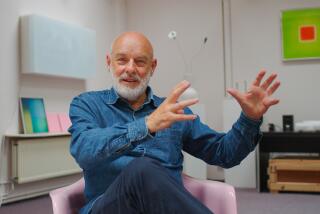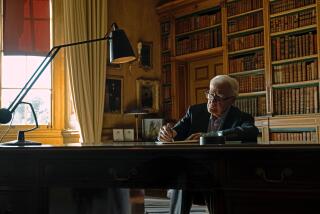MOVIE REVIEW : A Genius at Work--and Play
- Share via
It’s the voice you notice first, measured and mechanical and asking the most unnerving questions, as if Robby the Robot had ended up with Albert Einstein’s brain. “Where did the universe come from and where is it going?” the voice asks, calm but insistent. “Did the universe have a beginning and what happened before then? Where does the difference between the past and the future come from? Will time ever come to an end?”
The body behind the voice is no less arresting. Almost immobile in a wheelchair (only the hand operating the voice’s speech synthesizer is seen to move), it is a body dominated by a striking head, which, despite lolling to one side, radiates impressive strength through piercing eyes. It is the head of a wise old soul, of a clever elf, of a man who seems to casually possess all the knowledge of the ages.
Both voice and body belong to Stephen Hawking, the English theoretical physicist celebrated not only for his determination to find the answers to the biggest of questions, but for the personal obstacles he has had to overcome in his search. Having gradually lost not only his natural voice but also the use of most of that body to ALS, a motor neuron disability also known as Lou Gehrig’s disease, Hawking has still managed to become a scientific superstar whose book on these heady topics, “A Brief History of Time,” has both sold more than 5 million copies worldwide and served as the basis for this difficult but dazzling new documentary directed by Errol Morris.
Director of the groundbreaking “The Thin Blue Line” and as much of a creative force in his field as Hawking is in his, Morris was a thoughtful fit for this project. With an academic background in both the philosophy and history of science, he is smart enough to understand Hawking’s work (no small task, all those sales of no doubt half-read books to the contrary). And as one of the most inventive of documentarians, open to all manner of clever and innovative techniques, he is able to make Hawking’s dizzying concepts as accessible as they are going to get. The result is a film that is genuinely mind-expanding, an exhilarating intellectual gantlet that tells a remarkable human story.
Though the book “A Brief History of Time” is concerned only with science, Morris’ film (at selected theaters, Times-rated Mature) has smartly chosen to integrate Hawking’s life with an explication of his work. And while that exceptional personal history is more than absorbing in its own right, it also provides something human and concrete to hold onto while the mind reels from the effort of coming to terms with those dauntingly abstract theories, filled as they are with elusive concepts like black holes and imaginary time.
Born 300 years to the day after the death of Galileo and from childhood on giving every evidence of being brighter than bright, Hawking was also, not to put too fine a point on it, a goof-off of cosmic proportions, someone who even at Oxford felt an hour a day was quite enough time to spend on one’s studies.
Then, at age 21 in 1963, Hawking was diagnosed with ALS and given 2 1/2 years to live. Previously aimless and bored with his life, the disease focused him and encouraged a search for purpose. He met and married a young woman named Jane Wilde, decided that cosmology was to be his field, and despite the disease relentlessly pressing on him like a giant vise, continued to do groundbreaking work on the origin of the universe.
In order to involve audiences in Hawking’s life and thought, Morris uses traditional documentary methods but employs them with a fluidity and puckish verve that are very much his own. He is, for instance, not afraid of alternating striking, smartly done computer-generated visualizations of various aspects of black holes with a ponderously silly clip from an old Disney film called “The Black Hole,” and his shot of a rather perplexed chicken outlined against the universe as Hawking solemnly intones, “Which came first, the chicken or the egg,” couldn’t be bettered.
Although he irritatingly refuses to identify them until the final credits, Morris is equally successful in his use of the talking heads without which no documentary would be complete. Whether he’s dealing with Hawking’s amiably eccentric family, his affable old school chums or renowned fellow scientists like Roger Penrose and John Wheeler, the director has an infallible ear for the best possible quotes, sound bites that are at once pithy, playful and slightly off center. Equally fitting is the trademark Philip Glass score, which in the context of the kinds of questions this film explores sounds appropriately somber, spooky and just the slightest bit unnerving.
If there is anything unnerving in a negative sense about “A Brief History of Time,” it is Morris’ perhaps inevitable tendency to mythologize Hawking, to turn him into a sort of secular Buddha who sits in placid and all-knowing contemplation of the universe. No mention is made of any but the most flattering comments on his work, and the fate of Hawking’s wife Jane, who does not appear in the film because her husband recently left her to move in with one of his nurses, is never referred to even in passing. The British press, one may be sure, was not so circumspect. Headlined the shameless Daily Mail, “Wheelchair physicist in love tangle with nurse.”
Yet despite these lapses, “A Brief History of Time” remains that rare film that is intellectually challenging and therefore easy to forgive. Never mind that it is periodically difficult to follow, dense with theory and terminology, rife with puzzles and paradoxes. At its best it offers a glimpse of eternity, a peek under the curtain of time, and if that look makes the head spin a bit, it does so in the most satisfying way.
‘A Brief History of Time’
An Anglia Television/Gordon Freedman production, released by Triton Pictures. Director Errol Morris. Producer David Hickman. Executive producer Gordon Freedman. Based on the book by Stephen Hawking. Cinematographers John Bailey, Stefan Czapsky. Editor Brad Fuller. Music Philip Glass. Production design Ted Bafaloukos. Art director David Lee. Running time: 1 hour, 20 minutes.
Times-rated Mature.
More to Read
Only good movies
Get the Indie Focus newsletter, Mark Olsen's weekly guide to the world of cinema.
You may occasionally receive promotional content from the Los Angeles Times.











